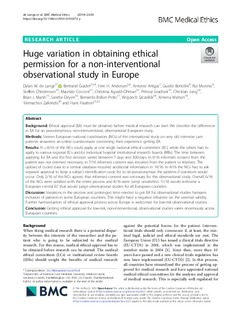| dc.contributor.author | de Lange, Dylan W. | |
| dc.contributor.author | Guidet, Bertrand R. | |
| dc.contributor.author | Andersen, Finn Husøy | |
| dc.contributor.author | Artigas, Antonio | |
| dc.contributor.author | Bertolini, Guido | |
| dc.contributor.author | Moreno, Rui | |
| dc.contributor.author | Christensen, Steffen | |
| dc.contributor.author | Cecconi, Maurizio | |
| dc.contributor.author | Agvald-Öhman, Christina | |
| dc.contributor.author | Gradišek, Primož | |
| dc.contributor.author | Jung, Christian | |
| dc.contributor.author | Marsh, Brian J. | |
| dc.contributor.author | Oeyen, Sandra | |
| dc.contributor.author | Bollen Pinto, Bernardo | |
| dc.contributor.author | Szczeklik, Wojciech | |
| dc.contributor.author | Watson, Ximena | |
| dc.contributor.author | Zafeiridis, Tilemachos | |
| dc.contributor.author | Flaatten, Hans | |
| dc.date.accessioned | 2019-09-26T07:28:53Z | |
| dc.date.available | 2019-09-26T07:28:53Z | |
| dc.date.created | 2019-08-14T14:52:38Z | |
| dc.date.issued | 2019 | |
| dc.identifier.citation | BMC Medical Ethics. 2019, 20:39 1-7. | nb_NO |
| dc.identifier.issn | 1472-6939 | |
| dc.identifier.uri | http://hdl.handle.net/11250/2618851 | |
| dc.description.abstract | Background
Ethical approval (EA) must be obtained before medical research can start. We describe the differences in EA for an pseudonymous, non-interventional, observational European study.
Methods
Sixteen European national coordinators (NCs) of the international study on very old intensive care patients answered an online questionnaire concerning their experience getting EA.
Results
N = 8/16 of the NCs could apply at one single national ethical committee (EC), while the others had to apply to various regional ECs and/or individual hospital institutional research boards (IRBs). The time between applying for EA and the first decision varied between 7 days and 300 days. In 9/16 informed consent from the patient was not deemed necessary; in 7/16 informed consent was required from the patient or relatives. The upload of coded data to a central database required additional information in 14/16. In 4/16 the NCs had to ask separate approval to keep a subject identification code list to de-pseudonymize the patients if questions would occur. Only 2/16 of the NCs agreed that informed consent was necessary for this observational study. Overall, 6/16 of the NCs were satisfied with the entire process and 8/16 were (very) unsatisfied. 11/16 would welcome a European central EC that would judge observational studies for all European countries.
Discussion
Variations in the process and prolonged time needed to get EA for observational studies hampers inclusion of patients in some European countries. This might have a negative influence on the external validity. Further harmonization of ethical approval process across Europe is welcomed for low-risk observational studies.
Conclusion
Getting ethical approval for low-risk, non-interventional, observational studies varies enormously across European countries. | nb_NO |
| dc.language.iso | eng | nb_NO |
| dc.publisher | BMC (part of Springer Nature) | nb_NO |
| dc.rights | Navngivelse 4.0 Internasjonal | * |
| dc.rights.uri | http://creativecommons.org/licenses/by/4.0/deed.no | * |
| dc.title | Huge variation in obtaining ethical permission for a non-interventional observational study in Europe | nb_NO |
| dc.type | Journal article | nb_NO |
| dc.type | Peer reviewed | nb_NO |
| dc.description.version | publishedVersion | nb_NO |
| dc.source.pagenumber | 1-7 | nb_NO |
| dc.source.volume | 20:39 | nb_NO |
| dc.source.journal | BMC Medical Ethics | nb_NO |
| dc.identifier.doi | 10.1186/s12910-019-0373-y | |
| dc.identifier.cristin | 1715955 | |
| dc.description.localcode | © The Author(s). 2019 Open Access This article is distributed under the terms of the Creative Commons Attribution 4.0 International License (http://creativecommons.org/licenses/by/4.0/) | nb_NO |
| cristin.unitcode | 194,65,25,0 | |
| cristin.unitname | Institutt for sirkulasjon og bildediagnostikk | |
| cristin.ispublished | true | |
| cristin.fulltext | original | |
| cristin.qualitycode | 1 | |

